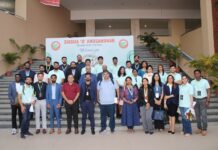By Our Business Bureau
BHUBANESWAR/PARADIP/JODA/KOIRA: It seems, the fate of mega Steel projects in Odisha’s coastal districts of Jagatsinghpur , which houses Paradip Port, looks not lucrative with one after another Mega Steel Companies facing resistance either from locals or from social and environmental activists.
After South Korean Steel major POSCO exit from Odisha, JSW Utkal Steel Ltd, of JSW Steel Group of Sajjan Jindal is eyeing the POSCO slot in Jagatsinghpur but things look not easy with several leading activists announcing in Bhubaneswar to oppose the JSW Utkal Steel Ltd projects.
Lok Shakti Abhijan Convenor Prafulla Samantara and former CPI MLA Radhakant Sethi have have alleged that the new steel plant project is more dangerous than Posco.
“The proposed project is a 13 million ton per year steel plant along with cement, cold and hot rolled mills and 900-MW power plant. Each is a pollutant unit. There will be huge cumulative effect on environment and the pollution will invade air, agriculture land as well as water bodies,” they said.
This will have also a port at Jatadhari which will be harmful to agricultural land and fisher community. The cumulative pollution will spread more than 20 km radius for which more than 50,000 villagers of nearby villages will be affected and deprived of livelihood,” they alleged.
On the contrary, they demanded a proper environment impact assessment report for the new project and discarded the one already done, what they said to be lacking facts.
They said that after POSCO left its project, the forced acquired land has to be returned to the farmers as per the Land Acquisition Act, 2013. Similarly, the people who opposed POSCO are still facing false charges slapped by police. When the old issues are yet to be settled, another plant is imposed on the people of the locality. It is neither desirable nor necessary, they told.
They warned that there will be intensive protest and the people won’t allow the project to take off.They also alleged that since the district Collector is a local person, he is using his personal connections to favour the company and demanded that he should be transferred.
Sources said, even as JSW Steel cut its capex guidance for FY20, the company is looking at bidding for a majority of the 20 iron ore mines in Odisha to secure raw material for its greenfield and brownfield projects.
Sources also said the company was bidding for mines given the 20 mtpa greenfield project in Odisha. “The mines in Odisha will primarily help the company secure the future raw material needs of the new plant in Odisha, but it will be taken to other plants as well to meet the requirement,” he added.
According to sources close to the development, the Odisha tender has a reserve price or premium requirement of 15-50% depending on the resources available at the mines. This would mean the miner will have to pay the government between 15-50% of the price per tonne of iron ore as premium. The cost of iron ore in Odisha ranges between Rs 2,000 per tonne to Rs 6,000 per tonne depending on the grade.
The Odisha mines would be viable for JSW Steel in the long term only if it is used for greenfield plant near the mines. Otherwise, the landed cost would be higher compared with the iron ore available in Karnataka where JSW Steel plants are located. The ore is available at `3,000 per tonne to Rs 4,000 per tonne in Karnataka with an additional `500/tonne for transportation. It is better to import a higher grade iron ore from abroad for `6,500 per tonne than to import from the east coast of India to the west coast, sources said.
The steel ministry has planned a target of 300 mtpa of steel capacity by 2030 from 100 mtpa at present that would require additional iron ore mining leases in coming years. The Federation of Indian Minerals Industry said India is set to auction 48 mining leases of independent miners before March 31, 2020, which will be effective for 50 years.
The federation has, however, expressed concern over the delay in auctions of mining leases that are due to expire in March. It believes that the delays could disrupt India’s iron ore production and raise the prospect of higher imports.
Even Citigroup had forecast that the country could become a net importer of 25 million to 30 million tonne of iron ore as the expiry of mining leases threaten to disrupt nearly a quarter of India’s output. This would be highest in records since 2009.
Odisha produced around 120MT iron ore in FY19, or more than half the national production and as per NEERI, this can go up to over 180MT annually.
The expert also said there is a huge bottleneck in transporting iron ore from Odisha mines to end-use plants or ports due to restriction on transportation timing, non- availability of rakes, and the scarcity of railway sidings.






















